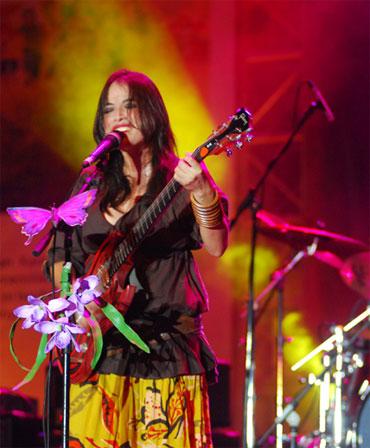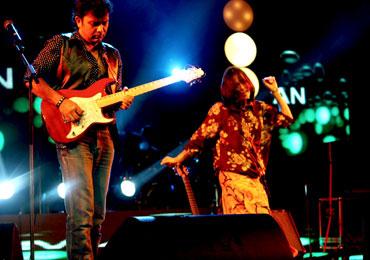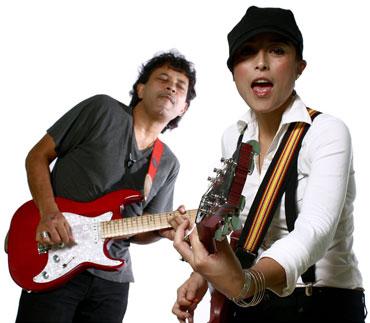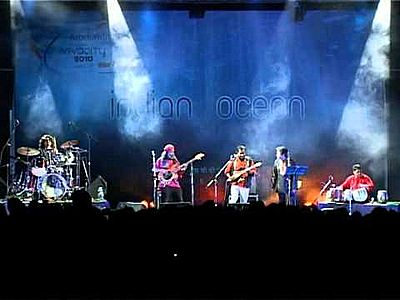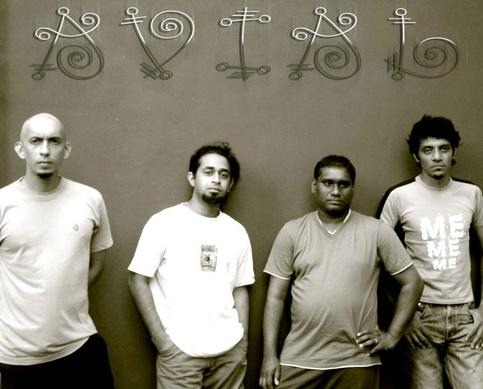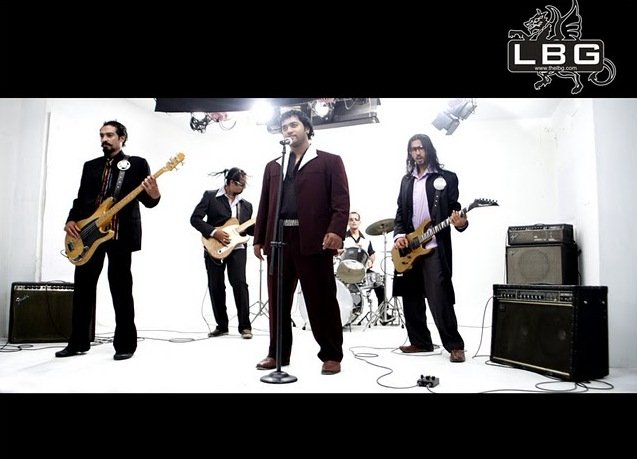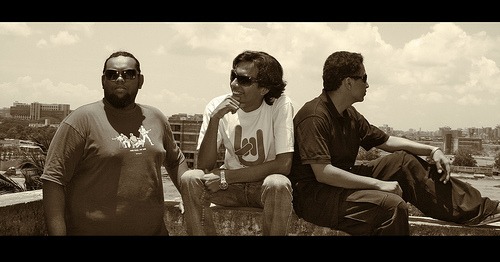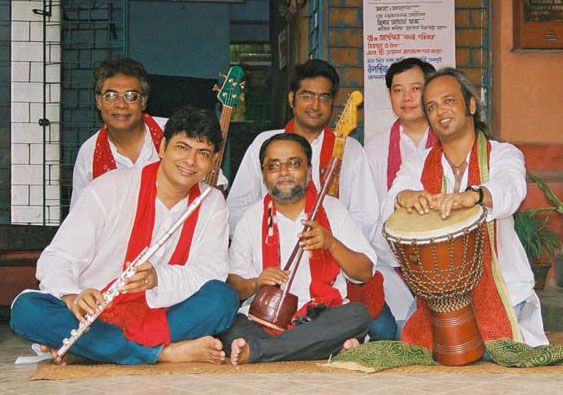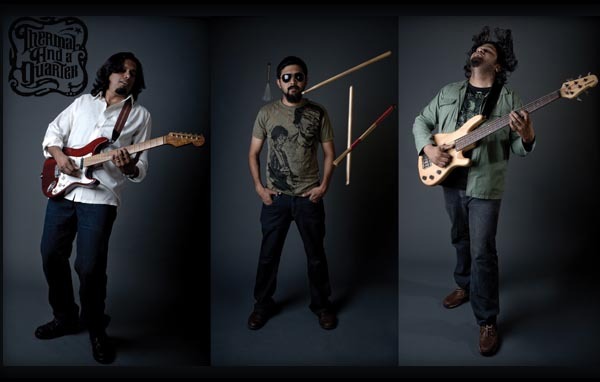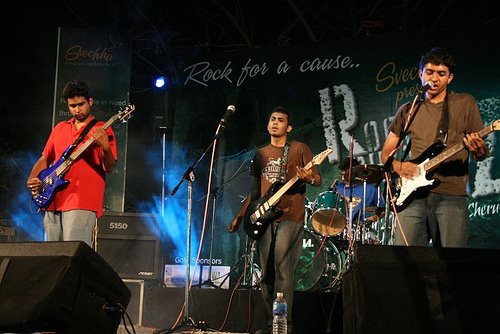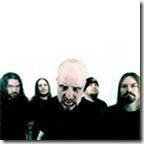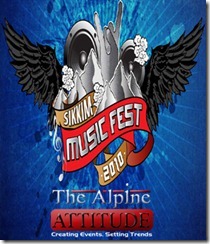By Vivek Menezes

Our first glimpse of Lou Majaw comes just outside the Guwahati airport – his face is building-sized, emblazoned high above the multi-lane expressway to Meghalaya, on an advertisement for Star Cement. These billboards turn out to be ubiquitous along our route. By the time we’ve wound our way up from the Brahmaputra floodplains into the cloud-wreathed Khasi hills, the legendary rocker of the North-East seems a reassuringly familiar fixture of the landscape, even the toddler in our midst chortling with glee every time his flowing silver hair looms up ahead, instantly recognizable even in the fading light that slowly obliterates the thick pine forests that line the steep, curving road to Shillong.
But when we set out to find him the very next morning, the man seems as elusive as the fast-rising mists that are a permanent fixture of life in his hometown. We knew that Lou Majaw doesn’t go on the Internet, but now we learn that he doesn’t have a permanent contact number, or even a particularly fixed address. Then we discover that you can’t buy a copy of any of his albums in any of the music stores in Shillong either.
One day goes by, then two, no signs of the Khasi cowboy in his signature cut-off jeans, and we console ourselves with innumerable platesful of smoked pork and fermented soybeans from the jadoh stall on the corner of the street in Laitumkhrah that’s known as his stomping grounds.
“Just chill out there in the evenings, and you’ll see him walking down towards you before too long,” we’ve been told by more than one of his old friends, and so we return at sunset again and again, trailing happily up the hill past the churches and colleges packed in densely in this buzzing neighborhood of young people from across the region; schoolgirls resplendent in matching cardigans and kilts, teenagers head-to-toe clones of Soho hipsters.
Trudging steadily past the looming, gigantic Cathedral, the toddler on my shoulders grows suddenly silent as we catch the soaring sound of a choir in full voice. I realize with a start that it is Sunday, and we hesitate on the hillside until the throbbing Khasi hymn comes to an end.
**
The story of western music in the North East of India starts with the church, more precisely with one very unusual missionary from Wales named Thomas Jones.
In 1841, the young Weshman clambered up into the Khasi hills from the opposite direction from the one we had taken along the Guwahati-Shillong highway. At that time, the capital of Assam was the ancient Khasi stronghold of Sohra (Cherrapunjee), and this is where Jones headed after a long boat ride from Calcutta, up the Hooghly and the Sunderbans to Sylhet far below the tribal highlands.
Thomas Jones is pure paradox. He belonged to a rigorous and conservative missionary order, but never converted anyone in his years in the Khasi hills. Eventually, he was considered disreputable by his own order, which expelled him, and he died in a kind of disgrace in Calcutta, where his tomb lay abandoned until the Khasis came looking for it.
Jones earned the permanent loyalty of the tribals of the Khasi hills by introducing a series of path-breaking innovations in agriculture, masonry, carpentry, accounting, and especially, in the use of locally mined coal to fire limestone kilns. He kick-started the industrial revolution in the region: Sohra immediately prospered.
Most important from the Khasi viewpoint, Jones dedicated himself to bringing their (previously unwritten) language into the modern era by casting it in the Roman script. He started to translate the Bible, as well as a famous Welsh novel ‘Rhodd Mam’, and compiled a dictionary and reader in Khasi.
This energetic son of distant Montgomeryshire was compelled to leave the hills by 1847, and died almost immediately after. So he never saw the epic wave of conversions that followed his death, as the Garos, Mizos and Nagas each sought to emulate the perceived success of the Khasis - each tribe in turn seizing on to the Roman script for their language, and converting to Protestant Christianity nearly en masse. It’s eye-poppingly ironic to note that Jones denomination – the Welsh Presbyterians – have more than 100 members in the Khasi hills for each solitary one back in Wales.
After Jones, there broke out a lasting scrum over conversions, as a range of European denominations raced to recruit the Khasis and other tribals of the North East. From the beginning, colonial observers commented about the tribal facility for music, especially chorale singing. But instruments required by church music proliferated fast as well: the very first Khasi who ever went to Europe was an expert violin player who is remembered for getting to shake the hand of Benito Mussolini. Leviticus Rapthap played for more than 50 years in that same Laitumkhrah Cathedral, a lifelong member of the choir that caught the ears of my toddler on a crisp May evening.
**
And that is just when we see him, head thrown back and laughing, intent in conversation in the middle of a busy sidewalk, with a stream of quick-moving college students forking around his broad back. The toddler leaps with delight on my shoulders: “Loulie! Loulie! Lou Majaw!” We walk up excitedly, shake his hand and tell him, “we’ve come up to Shillong all the way from Goa just to celebrate Bob Dylan’s birthday with you!”.
But Lou’s not looking very thrilled at all, “they’re coming from all over ” he tells me finally. But I want more, I tell him I would like to hang out with him before the concert, and all day on the 24th of May. I want to bring my sons to the kids concert on the slope of Jaiaw, to also attend the show-stopper in Police Bazaar in the centre of town on that night. I want to photograph everything, too, and I’ve got a little Flip to video everything alongside. All this blurted out and the rocker is still just looking at me, impassive and unmoved. Then I can see something occur to him, and he looks me straight in the eye to communicate it. “Hey man,” says Lou Majaw with a little smile and shrug of indifference,” it’s a free country.”
I've known hunger since I was ten
Loneliness is my good friend
I've learnt to laugh when I feel sad
When I see good times turnin' bad
I’ve known love and hatred too
The pain of dreams that don’t come true
But I’m on the other side now
Of this sea of sorrow
Because I can see the light now
And I know how the wind blows
(Sea of Sorrow, Lou Majaw)
Despite lacking regular airport and rail connections to the rest of the world, and its unusually remote location in the tabletop mountains of Meghalaya, itself connected (like the rest of the North –East) to India only by sheer happenstance (and a tiny strip of territory called “the chicken’s neck”), Shillong retains an outsized sense of self-importance.
This is because of its historical status - for more than 100 years right until 1972, it was the all-important administrative capital for colonial Assam, which was a huge swathe of territory including the present-day states of Nagaland, Arunachal Pradesh, Manipur and Mizoram.
So even when Lou Majaw was born into a poor Khasi family in 1947, there was a sense of connection to the greater world distinguishing this city from others in the region. Shillong was cosmopolitan, and markedly more westernized than most of the rest of the subcontinent, with a large contingent of Europeans in permanent residence.
So it’s not at all surprising that there was a sustained appetite for the latest music from abroad - Majaw has often spoken about the life-changing moment when he heard the irresistible beat of Bill Haley and Elvis Presley’s music blaring from the hi-fi at a neighbour’s house (his own family was too poor to afford a radio).
The young Khasi started haunting his school music room to practice on the guitar that was stored there, and from the beginning, he schemed to form his own bands. The moment he’d saved up enough money to take the chance, Majaw made out for Calcutta to try and make it in the music scene there.
He worked a series of dead-end day jobs while playing in bands like the Dynamite Boys, Supersound Factory, and Blood and Thunder. And then in 1966, the young musician heard an album called The Freewheelin’ Bob Dylan.
“Everything changed then,” Majaw has often repeated, “Dylan opened my mind to new possibilities.” He turned back to Shillong, and started to play only his own compositions. In 1980, he founded Great Society - still probably the greatest original Indian rock band of all time – also dedicated exclusively to original music. By then, he’d already celebrated Bob Dylan’s birthday with a free concert in Shillong for 8 years in a row.
**
Like much of the rest of Shillong, the residential neighborhood of Jaiaw feels instantly familiar, but as you keep looking you can see that it is actually like no other place on earth.
The architecture feels quaint and old-world, like a low-budget movie set version of Edwardian London. But then you see the women in the streets are wearing jainsems, the iconic toga-like drape of the Khasis, and their cheeks bulge with betel-nut. And all the while the mists rise to slick the blacktop, leaving the visitor with the distinct sensation of having entered another realm of existence altogether.
That sense of disorientation continues as we enter the gates of the Pearly Dew school on May 24, 2010, where blazered and kilted students are lined up in bleachers at the side of the basketball court, under the watchful eye of their school principal. I find myself remembering how subversive rock music has been considered almost all through its existence, how unlikely this whole scene is, and then up to the mike bustles Lou Majaw with thanks to Kong Ibari (the school principal, now beaming), and then, just like a ritual invocation, “Happy Birthday Bob Dylan, wherever you are and God bless you. Thank you for everything that you’ve done for us, and especially for Lou Majaw.”
And now is when we really start to realize how unusual this place is – the first ringing chords of ‘Don’t Think Twice, It’s All Right’, and we can immediately feel a wave of sound coming from the audience all around us. We look left and right – dozens of children are singing along intently, they all know the words. How do they know all the words?
We see the teachers lined up along a balcony overhead – they’re singing too. Out of the corner of my eye, there is Kong Ibari, singing lustily as well, eyes closed and head rocked back. It’s surreal beyond measure, and I blink a few times to ensure that it’s not a dream, but still it gets wilder. Now the entire crowd of North-Eastern tribals is singing along to every line of ‘Knocking on Heaven’s Door’ as though it’s the Khasi national anthem. Is it the Khasi national anthem?
And then a band of adorable, rosy-cheeked kiddies troops on, smiling bashfully like all little kids do when they’re about to do something embarrassing . But when the guitar starts up, my remaining hair stands on end as they burst into a scorching version of ‘Man Gave Names to All The Animals, ” this score of irresistable tribal tykes headbanging authentically like so many miniature Ramones.
And Majaw back again, exhorting the schoolchildren to break ranks. Mayhem at Pearly Dew. The little Khasis tear at him, and he at them. I look around desperately to see if someone’s in control here, cover the toddler’s eyes against the riot in front of us. Now Majaw is urging the kids to sing along. "Everybody must get stoned!" he bellows at them. "Everybody must get stoned!" they chorus back, completely delirious with excitement.

I locate Kong Ibari in the crowd, formidable straight-laced headmistress, surely she’s going to pull the plug. But no, Kong Ibari has a huge smile cleaving her face, she's a picture of pure pleasure. I watch on in amazement as her lips frame the refrain. "Everybody must get stoned!"
**
No one has quite adequately explained the explosive chemistry that occured when folk, rock and blues music arrived in the North-Eastern states of India.
Many other parts of India have been exposed to the influence of the church (which is often cited as reason number one), and to westerners in general (which is often cited as reason number two), but none of them ended up the same way.
More persuasive (but still not entirely satisfactorily so) is the theory that rock music still retains the ability to be subversive, to sound out alienation and disillusionment. This makes a bit of sense because, despite plenty of competition, there is no place in the subcontinent nearly as alienated and disillusioned as the North East, left threadbare and disconnected by the partition of Bengal, and consistently torn apart since then by state brutality and secessionist movements.
Democracy, to the extent it is practiced here, doesn’t really help very much because all of the North East’s forty-odd million people don't add up to even four per cent of the giant Indian electorate, and this entire, mindbendingly complex region made up of dozens of separate “nationalities” has a grand total of exactly 25 seats out of 543 in the Lok Sabha. To boot, the main characteristics of Delhi’s reign over the past 50 years have been indifference and venality.
But even if no one can properly explain why the North East has fallen so hard for this music born out of the black American experience, no one can deny that it has extended deep roots into the cultural landscape of the region. The Naga folk blues, the protest rock bands of Manipur, they’re all part of the same phenomenon that culminates in the Shillong scene, where the level of fervour is simply impossible to describe, where the world record for largest ever guitar ensemble was set in 2007 when 1721 guitarists got together to play their favourite song, the most famous tune across the Khasi hills.
Er, what was the sole tune familiar to all 1721 guitarists, and to every guitarist in Meghalaya besides? Yup, it was ‘Knocking on Heaven’s Door’ by Bob Dylan. It really is a kind of Khasi national anthem.
***
Much later on the 24th, family tucked safely in bed, I am squeezed in among the sound technicians at the back of a stage erected high on Police Bazaar, watching Lou Majaw project his rock-and-roll personality right across the centre of his home town.
It is typical of the chaotic style of this pulsating, traffic-choked city that the streets that lead on to the junction commanded by the stage are still open, and cars and buses are pouring into the roundabout, honking their way through the throng.

Several local acts had gone before – almost all of them rather sweetly decked out in cowboy hats and boots - and played some of the most famous Dylan songs, but now it’s just Majaw and the snarling guitars of his backup band, The Bad Monkeys, and now the show is clearly for adults only.
Majaw is all strut and posturing, the crowd can barely contain itself. He strips off his shirt, and stalks the stage with his guitar held triumphantly high. It's badass percussive rock of the kind that fills stadiums the rest of the world over. And so the realization begins to dawn into my consciousness: this is the real deal. Lou Majaw is the genuine article. The Bob Dylan shtick is sincere, but well besides the point. This show has nothing to do with the American, instead it’s all about the Khasi.
**
Steam is still coming off Lou Majaw’s body as he carefully winds his guitar cable in his hands and fires instructions to his crew, while winking across the invitation I've been waiting for. Ten minutes later, I’m in an SUV full of Bad Monkeys, and we’re off to party in Bah Lou’s cottage at the Shillong Club. The boys drop me off and head to pick up the food, and I find myself alone with Majaw, who is now wearing a soft sweater to fend off the chill, and is suddenly looking his age.
This has been his 39th consecutive Bob Dylan birthday concert, and even Bah Lou must know that he can’t go on doing this forever. He closes his eyes for a minute, and once again I am struck by the sheer uniqueness of what I’ve been witnessing.
But then the room fills again with the young musicians of Shillong, and whisky starts to flow. Smoked pork and fermented soybeans make their appearance too. And now there are snatches of songs heard from different parts of the room. The guitar comes out again, and inevitably, more Dylan. Almost everyone who walks in reaches for the instrument and plays something remarkably accomplished.
At some time near 4am, one of Shillong’s top cops comes in, and he too goes straight for the guitar. “Everyone ready”, he says, and then he plays one of the great songs from Nashville Skyline, my favourite of all the Dylan records.
I can hear that whistle blowin'
I see that stationmaster, too
If there's a poor boy on the street
Then let him have my seat
'Cause tonight I'll be staying here with you.
Throw my ticket out the window
Throw my suitcase out there, too
Throw my troubles out the door
I don't need them any more
'Cause tonight I'll be staying here with you.
Note: A considerably shorter version of this essay is in this month's Himal Magazine, availablehere.












 Only 13,000 tickets sold as young people say show prohibitively expensive; after making arrangements for 30,000 fans, organisers now say they will be happy if 20,000 turn up
Only 13,000 tickets sold as young people say show prohibitively expensive; after making arrangements for 30,000 fans, organisers now say they will be happy if 20,000 turn up














